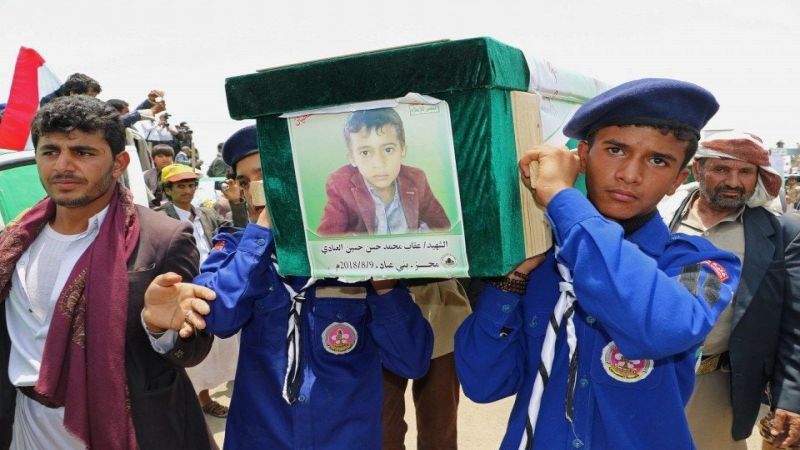
By Rasha Mohamed
The bus brimming with singing children on a field trip had stopped for snacks at a market in Saada, in northern Yemen, when it was hit by a now-infamous air strike. The Saudi Arabia-led coalition attack on Aug. 9, which it claimed was a “legitimate military action,” killed 51 people, including more than 40 children.
When I spoke to the director of a nearby hospital afterward, he described how the blast was so powerful that, instead of corpses, the morgue received a mangled mess of severed limbs and body parts. So many childhoods were snuffed out in an instant, using what appeared to have been a U.S.-manufactured and -supplied Lockheed Martin precision-guided bomb found at the site.
Sadly, the discovery of U.S. munitions amid the rubble of civilian markets, homes, hospitals and hotels has been a constant throughout Yemen’s devastating war, now well into its fourth year. Since Saudi Arabia-led coalition air strikes began in March 2015, Amnesty International has visited and investigated dozens of air strike sites in eight governorates. We have repeatedly found and examined remnants of munitions manufactured in the United States — as well as Britain and Brazil. Investigators from the United Nations and Human Rights Watch have unearthed similarly credible evidence.
So it should come as little surprise that a U.N.-mandated body issued a report this week that contains a stark recommendation: It calls upon nations to refrain from supplying weapons that could be used in the conflict. And that includes, perhaps most importantly, the United States, which, by continuing to transfer weaponry to its Saudi allies, may be at risk of making itself an accessory to war crimes.
In one case, documented by Amnesty International, on Aug. 25, 2017, a U.S.-manufactured Raytheon Paveway laser-guided bomb struck civilian homes in Yemen’s largest city, Sanaa. Five-year-old Buthaina was the sole survivor in her family; she lost five siblings ages 2 to 10 and both of her parents.
On Aug. 15, 2016, a Paveway guided missile hit a fully functioning Médecins Sans Frontières (MSF) hospital, killing 11 people, including an MSF staff member, and injuring 19 others. This deprived a vulnerable population of vital health care and prompted MSF to withdraw staff from six other hospitals in northern Yemen.
Earlier this year the U.N. Panel of Experts published report presenting evidence of U.K.- and U.S.-manufactured Paveway systems used in nine strikes. They resulted in 84 civilian deaths (with 77 injured) — 33 of them in a single incident, when a high-explosive bomb, assisted by a Paveway guidance kit, struck a motel in Arhab on Aug. 23, 2017. This is surely just the tip of the iceberg.
Despite copious evidence of U.S. weapons — including internationally banned cluster munitions — being used to carry out attacks that have violated international humanitarian law (the laws of war) and killed and injured Yemeni civilians, the Trump administration is unrepentant. It reversed a December 2016 Obama-era decision to suspend transfers over concerns about civilian casualties and, on a trip to Riyadh, President Trump himself touted a “tremendous” new multibillion-dollar arms deal with Saudi Arabia. Based on our detailed investigations, Amnesty International has been calling on all countries supplying arms to immediately halt transfers and military assistance to all parties to the conflict for use in Yemen.
U.S. military officials appear increasingly rattled by reports of the deaths caused by American weapons. When pressed, Defense Secretary James Mattis told reporters at the Pentagon on Tuesday that U.S. support to the Saudi Arabia-led coalition is “not unconditional.”
Congress is also bringing pressure to bear. The recently signed 2019 National Defense Authorization Act (NDAA) orders Mattis to review whether the United States or its allies violated human rights in Yemen, including during detainees captured by United Arab Emirates forces and their allies. Additionally, it bars the U.S. military from refueling Saudi Arabian and Emirati warplanes unless the secretary of state certifies that the coalition is taking steps to reduce civilian casualties.
But the Trump administration has been fighting back against congressional oversight. Trump’s signing statements to the NDAA suggest that the White House may not believe that it is bound by these provisions. Moreover, the Trump administration may override the attempt by Sen. Robert Menendez (D-N.J.) to block the latest sale of Raytheon precision-guided weapons to the Saudi Arabia-led coalition.
It is imperative that the administration reflect on how its unflinching support to the coalition has contributed to the unlawful killing and injuring of countless civilians, the destruction of homes, schools and hospitals, and the creation of the world’s worst humanitarian catastrophe.
The United States can’t have it both ways. The government is rightfully proud when it provides items that speed humanitarian assistance to Yemen, but at the same time it is providing bombs that kill children.
The one sure way to fix this is for the United States to suspend all arms transfers to the coalition for as long as those arms are being used to violate the laws of war in Yemen.
Source: The Washington Post, Edited by Website Team